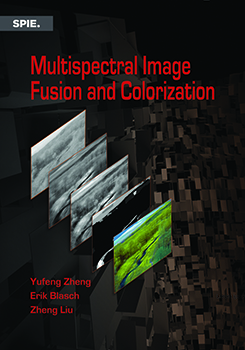
This will count as one of your downloads.
You will have access to both the presentation and article (if available).
Model-based, multi-sensor fusion and bundle adjustment for image registration and target recognition
This will count as one of your downloads.
You will have access to both the presentation and article (if available).
This course presents methods and applications of multispectral image fusion and night vision colorization organized into three areas: (1) image fusion methods, (2) evaluation, and (3) applications. Two primary multiscale fusion approaches, image pyramid and wavelet transform, will be emphasized. Image fusion comparisons include data, metrics, and analytics.
Fusion applications presented include off-focal images, medical images, night vision, and face recognition. Examples will be discussed of night-vision images rendered using channel-based color fusion, lookup-table color mapping, and segment-based method colorization. These colorized images resemble natural color scenes and thus can improve the observer’s performance. After taking this course you will know how to combine multiband images and how to render the result with colors in order to enhance computer vision and human vision especially in low-light conditions.
In addition to the course notes, attendees will receive a set of published papers, the data sets used in the analysis, and MATLAB code of methods and metrics for evaluation. A FTP website is established for course resource access.
The focus of this course will be recent research results, technical challenges, and directions of Deep Learning (DL) based object classification using radar data (i.e., Synthetic Aperture Radar / SAR data). First, we will provide a short overview of machine learning (ML) theory. Then we will provide an example and performance of ML algorithm (i.e., DL method) on video imagery. Finally, we will demonstrate algorithmic implementation and performance of DL algorithms on SAR data (a significant portion of the course time).
It is evident that significant research efforts have been devoted to applying DL algorithms on video imagery. However, very limited literature can be found on technical challenges and approaches to execute DL algorithms on radio frequency (RF) data. We will present hands-on implementation of DL-based radar object classification using Caffe and/or TensorFlow tools. Unlike passive sensing (i.e., video collections), Radar enables imaging ground objects at far greater standoff distances and all-weather conditions. Existing non-DL based RF object recognition algorithms are less accurate and require impractically large computing resources. With adequate training data, DL enables more accurate, near real-time, and low-power object recognition system development. We will highlight implementations of DL-based (i.e., Convolution Neural Network (CNN)) SAR object recognition algorithms in graphical processing units (GPUs) and energy efficient computing systems. The examples presented will demonstrate acceptable classification accuracy on relevant SAR data. Further, we will discuss special topics of interest on DL-based RF object recognition as requested by the researchers, practitioners, and students.
This course provides attendees with a basic working knowledge of integrating automatic target recognition (ATR) capabilities within data, sensor, or information fusion systems. The course concentrates on ATR algorithmic designs and performance evaluation techniques for contribution in a multi-sensory system. Many practical and useful examples are included throughout. You will become knowledgeable with how to effectively design ATR systems for many varied applications. The course price includes the documentation presented by the instructor.
View contact details
No SPIE Account? Create one


